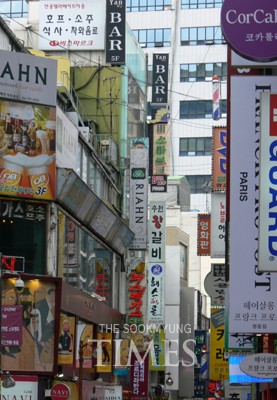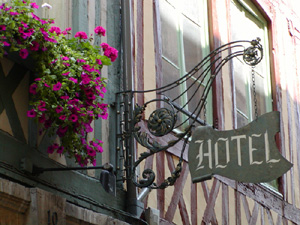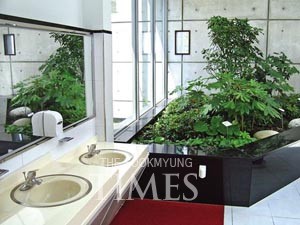
The Sookmyung Times (SMT) explains the reality of public designs, some instances of foreign public designs, and the movement for making more beautiful cities in Korea.
The Reality of Public Designs
Sidewalks
Yun Ju-seon, a pedestrian in Seoul said, “Streetscapes in Korea has changed for cars, not people.” This change is due to industrialization and ultra fast economic growth. Primarily, public designs have a motto; Design for All. However, many streets in Korea are narrow and lined with trees, signs and exposed goods for sale. Moreover, some cars occupy sidewalks illegally making narrow sidewalks even more narrow and uncomfortable. Beside, paved road that was made of stones was constructed for forbidding parking. However, it forbid not only parking, also pedestrian. In other word, sidewalks spoil beauty of city and conveinience for pedestrian.
Traffic Signs
With economic growth and increasing cars, traffic signs have become more important. Traffic signs are more apparent than ever before however, communication of information is even more difficult due to the disorderly maze of signs and negligence of management. Disorderly traffic signs spoil cityscape.
Telephone Booths
Currently, several telephone booths are despised by citizens. With the spread of cell phone, telephone booths are more needless than before. Telephone booths occupy too much space, moreover if telephone booths are damaged, they are not repaired, or the maintenance and upgrading of old booths is not being completed. It is time to change from the old design of booths to a newer one, and to reduce the number of booths to an efficient level that reflects the use of cell phones.
Waste Baskets
Waste baskets are unified for separate waste collection, but many waste baskets are dissimilar. Further, waste baskets are very insufficient, and a lot of waste ends up on the ground surrounding the waste basket. For this reason, waste baskets are unclean, and cause and unsightly mess to pedestrians and citizens.
Signs
Many signs are monotonous, rectangular forms and gothic types. These signs have nothing to do with design or traditional beauty. One cause is a paltry, unorganized sign manufacturing market. Numerous small-scale businessmen make signs without thinking about design and its impact as a whole. Moreover, merchants want unique signs because they think that only unique signs attract the public’s attention. In other words, unique signs make money. These competitive spirits between merchants make inconsistent signs that are made of cheap material and have an unorganized appearance. Rather than having a pleasing appearance to attract customers, it creates an overall ugliness to citizens.
Auto Toilets
Auto toilets are established in the city for persons who need to use them urgently. Of course, many people can use auto toilets, but for some people such as the aged, disabled and children it is difficult for them to use because of high stairs. Also, many people may feel inconvenient because there is not a coin changer near the auto toilet.
Examples of Foreign Public Designs
A Barcelona Street, in the home town of Antonio Gaudi who is a famous architect, is a design exhibition. There are spiral benches and streetlights and nicely designed signs. These factors create streetscapes that people want to walk on and enjoy.
In Germany, especially Hanover, there are some specific public tourist attractions. This city introduces concepts that portray bus stops as objects of public art displays through its ‘Bus stop project.’ Famous designers and architects are entrusted to design nine bus stops in the city in order for the bus stops to be viewed as new tourist attractions. Moreover, the city publishes guidebooks about the bus stops, displays posters and picture albums that display photographs from the beginning of the project to the finished design.
London England is famous for their ability to match features of traditional streets and streetscapes. Streetscapes have been designed with chocolate-colored furniture and telephone booths or red colored buses since the late 1980’s. People usually remember creative streets of London with dark brown and red that leaves a lasting and vivid impression of the city.
Generally signs of developed countries pursue ‘Variety in Unity.’ Signs of these countries are regulated so that they do not disturb well designed streetscapes. Signs of Europe are mainly achromatic colors with beautiful patterns. Signs in Japan are simple and small, and there are a lot of signs with traditional styles. Contrary to Europe or Japan, Hong Kong is well known for its neon signs. These neon signs are splendid, but not confused. Signs in Hong Kong are in harmony with red and traditional patterns that show features of Hong Kong.
The Movement for Making a More Beautiful City
Signs
The Seoul Metropolitan Government has been promoting the ‘Jongno upgrade project’ since 2006. This project centered on the reformation of signs. Last year, about 1,385 signs changed from simple to smart signs, and about 1,044 signs will be reformed in 2007. With this sign improvement project, the government has held an exhibition, ‘The Beautiful Sign,’ every year. Now the government is improving and controlling illegal signs for a more beautiful city. Not only the Seoul Metropolitan Government, but also private and other organizations are establishing and changing a shabby city into beautiful one. On January 5, representatives of The Hope Institute, the Ministry of Government Administration and Home affairs, Seoul Broadcasting System (SBS), the National Agricultural Cooperation Federation (NACF) and Korean Federation of Community Credit Cooperatives (KFCC) concluded a common agreement for making beautiful cities through picturesque signs. For beautiful signs, The Hope Institute established the Sign Culture Institute last January 30. The Hope Institute and Ministry of Government administration and Home affairs is promoting several events and projects. Also, the NACF and KFCC examined plans to finance new sign improvement projects. SBS selected to improve visual pollution such as outside signs and has prepared an advertising campaign.
Street Stalls
For a long time, disorganized street stalls have been a problem. The street stalls have become uncomfortable to pedestrians. However, now these street stalls will be improved through one project called, ‘New Start in Seoul Street!’ The government organized a committee for street stalls. First, the committee selects one street from an autonomous district that displays apparent problems with street stalls. Then, the committee decides on a plan and time frame to implement the new program. Next, the Seoul Metropolitan Government checks the street stalls in the first half of the term and finally, the government puts the program into operation in the latter half of the year.
A Plan for Improving Roofs and Walls
Since 2002, many roofs and walls have afforested. This plan was implemented by ‘Seoul Green Trust.’ The Seoul Metropolitan Government has spent a lot of money on this plan. This plan will not just be better for the environment, but it will be better for public scenery as well. Along with the plan for afforestation of roofs, there is also a plan for the afforestation of walls. This program is to plant ivy on all structures, such as a breast walls or outside walls thus helping to soundproof walls and improve the appearance.

Recently, there are fewer dirty toilets in Korea compared to a few years ago. New toilets should be clean and comfortable throughout country. Perhaps, many people know ‘Beautiful Toilets.’ ‘Beautiful Toilets’ was sponsored by the Ministry of Government Administration and Home affairs, and Better Korea Movement (BKM). People of BMK led the beautiful toilet movement. Lee Su-hong, the president of BMK, said that, “Toilets are a part of our living space. People are dismayed by unclean toilets. I’ll make a space that will enable people to look back respectfully.” In reality, beautiful toilets created much interest worldwide. Particularly, China and some other Asian countries came to Korea for benchmarking. Also, a group campaigning for cleaner public toilets was established in Korea the next year.
An Urban Bus Design
The Seoul Metropolitan Government and Brandworkz, total branding company, designed urban buses. They simplified the existing five bus service systems to four service systems and then, they implemented color coding and titles for each bus service. Even though a few public officers objected to the new designs due to them being too conspicuous, the Seoul Metropolitan Government pushed this plan ahead. This change offers more convenience to citizens.
For Making a More Beautiful and Better City
Why public designs are behind the other countries? Several public officers and the government did not recognize that public designs were important factors. They thought that designs were additional factors, so they did not give much concern and did not estimate the outcomes of public designs for a long time. They were only interested in efficient and practical methods without beauty. Recently, streetscapes are becoming comfortable and convenient for people. Streetscapes should be designed keeping in mind beauty, practicality and convenience. There are many divisions within a city and there are many different people in charge of streetscapes, and because of this, designs are not considered holistically. Streetscapes such as waste baskets and streetlights do not show any unity from block to block. These problems should be corrected. It is necessary to have a united design system for upgrading streetscapes. Above all, we need to employ designers or architects to participate in public designs and public planning. When the government or some municipalities have plans that involve public design, they must think of the people and they need to be engaged with designers, city planners, architects, and public officers who have expert knowledge.
Public designs are becoming more important. However, public designs need to be implemented with global universality and regional originality.


